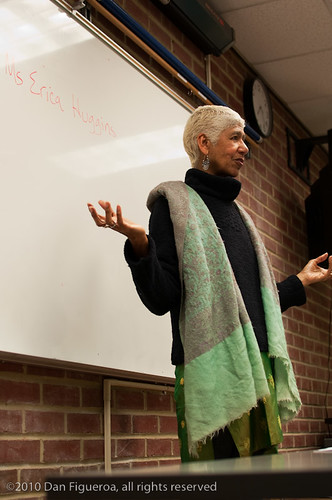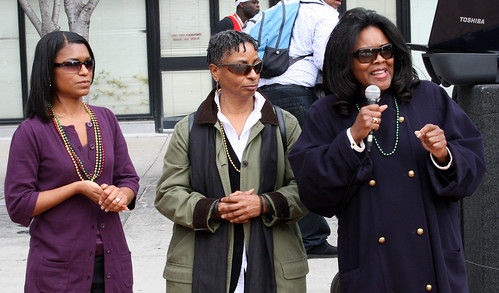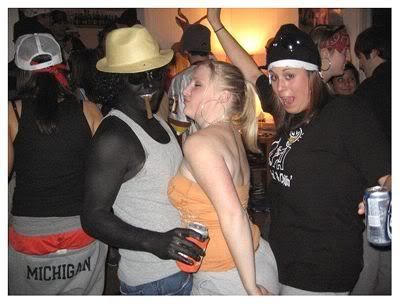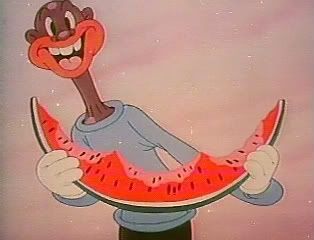Oakland's History of Black Economic Empowerment
2010 Black Hour Community Form Series "History of Black Economic Empowerment"

By Terez McCall
Oakland has long been a mecca for black enterprise, a place where African American businesses and communities have flourished. This tradition is still celebrated and carried on in the heart of Oakland's Black business districts. "The History of Black Economic Empowerment" was this year's theme for Black History Month, and five community members were invited to Laney College for a panel discussion on the subject.
The event was facilitated by Professor Tamika Brown, Chair of the Ethnic Studies Department and an entrepreneur herself. It was moderated by Laney student Reginald James, Tower staff reporter and host of the Black Hour Radio show. The theme was expanded to address details of our economic past, analysis of the present and projections for our future.
Participants included Michael Carter (Chairman of Black Wall Street Merchant's Association), Marcel Diallo (Black Dot Café owner), James Moore (executive producer of the Kwanzaa/ Christmas Gift Show), Retha Robinson (San Francisco Foundation director), and Geoffrey Pete (owner of Geoffrey's Inner Circle).
After panelists introduced themselves briefly, they responded to several prompts and opened it up for questions from the audience. A constant refrain of collectivity, responsibility, and cooperation was repeated throughout the discussion, while positive comparisons were made to Oakland's golden days in the 60's and 70's when Black businesses were thriving and communities were stronger despite many challenges.
One question brought to the table early on was the economic impact of slavery and its relevance to the present. What might have been had the economic development of Africa not been derailed? Moore shared the idea that the already impressive progress would have continued, contributing greatly to the world in stark contrast to the present situation.
There was also discussion of the illusion of class as being a barrier to working together in the Black community. As Diallo put it, many of us are essentially a paycheck or two away from disaster, and should not look down on others with suspicion. Unifying for common purpose is much more important than petty differences, and is necessary.
A point that stood out about black economic development was the inclusion of spiritual values. It is a more holistic approach than the typical market model, not simply looking toward profits but understanding the interdependent nature of things. Ultimately it's in our best interest to work collectively toward the greater good if our success is to be meaningful.
A significant difference about economic empowerment in the black community is the emphasis on the future generation. Instead of looking to strike it rich with no regard for fellow man woman and child, there is a strong sense of responsibility and leaving a legacy worth following. As Carter stated, "We don't do anything just for ourselves, but for those who come after us and their children and so on." Robinson echoed this sentiment, sharing the Shirley Chisholm quote that "service is our rent" and finding ways to give back is essential.
A message of encouragement was imparted as the conversation drew to a close. The panelists applauded the pursuit of higher education, emphasizing the influence and opportunity young people have to truly make a difference. In the end, as Pete stressed, no matter the challenges, the only one who can stop us is-ourselves.
Photos by Reginald James for The Black Hour.

By Terez McCall
Oakland has long been a mecca for black enterprise, a place where African American businesses and communities have flourished. This tradition is still celebrated and carried on in the heart of Oakland's Black business districts. "The History of Black Economic Empowerment" was this year's theme for Black History Month, and five community members were invited to Laney College for a panel discussion on the subject.
The event was facilitated by Professor Tamika Brown, Chair of the Ethnic Studies Department and an entrepreneur herself. It was moderated by Laney student Reginald James, Tower staff reporter and host of the Black Hour Radio show. The theme was expanded to address details of our economic past, analysis of the present and projections for our future.
Participants included Michael Carter (Chairman of Black Wall Street Merchant's Association), Marcel Diallo (Black Dot Café owner), James Moore (executive producer of the Kwanzaa/ Christmas Gift Show), Retha Robinson (San Francisco Foundation director), and Geoffrey Pete (owner of Geoffrey's Inner Circle).
After panelists introduced themselves briefly, they responded to several prompts and opened it up for questions from the audience. A constant refrain of collectivity, responsibility, and cooperation was repeated throughout the discussion, while positive comparisons were made to Oakland's golden days in the 60's and 70's when Black businesses were thriving and communities were stronger despite many challenges.
One question brought to the table early on was the economic impact of slavery and its relevance to the present. What might have been had the economic development of Africa not been derailed? Moore shared the idea that the already impressive progress would have continued, contributing greatly to the world in stark contrast to the present situation.
There was also discussion of the illusion of class as being a barrier to working together in the Black community. As Diallo put it, many of us are essentially a paycheck or two away from disaster, and should not look down on others with suspicion. Unifying for common purpose is much more important than petty differences, and is necessary.
A point that stood out about black economic development was the inclusion of spiritual values. It is a more holistic approach than the typical market model, not simply looking toward profits but understanding the interdependent nature of things. Ultimately it's in our best interest to work collectively toward the greater good if our success is to be meaningful.
A significant difference about economic empowerment in the black community is the emphasis on the future generation. Instead of looking to strike it rich with no regard for fellow man woman and child, there is a strong sense of responsibility and leaving a legacy worth following. As Carter stated, "We don't do anything just for ourselves, but for those who come after us and their children and so on." Robinson echoed this sentiment, sharing the Shirley Chisholm quote that "service is our rent" and finding ways to give back is essential.
A message of encouragement was imparted as the conversation drew to a close. The panelists applauded the pursuit of higher education, emphasizing the influence and opportunity young people have to truly make a difference. In the end, as Pete stressed, no matter the challenges, the only one who can stop us is-ourselves.
Photos by Reginald James for The Black Hour.












 Oakland, California. In a city where where pimpin' has been glamorized since the classic blaxploitation film, "The Mack" to rapper Too Short, comedian Don Reed's one man play "East 14th: Tales of a Reluctant Player" brings a refreshing, youthful message to the world's so-called, "oldest profession."
It just so happens to be a tale wrapped up inside platforms, bell bottoms, a cape and a sunroof Cadillac jamming soulful tunes.
"East 14th" is a funky, biographical, one-man play about Reed's journey through puberty, rocked by conflicting lessons, lifestyles and leaders. Set in 1970s Oakland, the performance is a nostalgic look back at a bygone era through the eyes of a child, all grown up.
As a young teen, Reed's mother remarries a strict man who belongs "to the religion that rhymes with 'tahovah's sitnesses.'"
"You know, the religion where they knock on your door at seven in the morning," Reed jokes. He chronicles the journey from his stepfather's home--straightlaced, no holiday or birthday celebrations (and certainly no nookie)--to moving into the home of his father, who just so happens to be a pimp.
"I just thought he was really into hats," Reed said. And when he interrupts some women paying his father, he jokes, "I thought they were his friends. I didn't know I was walking into an employees' meeting."
Reed hilariously recounts his first sexual experiences and the nervousness that came with it. He also once dated a prostitute without knowing it.
Two other major influences besides his father(s) are Reed's older brothers, Darrel and Tony. Darrel is a pontificating-to-the-point-of-nearly-stuttering ladies' man who goes on to work at a beauty salon for unhindered access to women. Tony is Reed's "über gay" older brother with a unmatched self-defense arsenal.
Troutmouth, a jive, fish-faced character who exaggerates his pimpish stature, serves as an example of who not to be.
The funniest part of Reed's performance involves an summertime incident where Reed, heading out to go rollerblading at Lake Merritt, runs out of sheen for his "Lord Jesus Perm." So he decides to use butter as a substitute.
The moral climax of the play comes when Troutmouth tries to kick game to Reed on entering the pimping profession. Reed's father returns home and confronts Troutmouth. He points to Reed's public speaking trophies from Chabot College, knowing that a great future of public speaking lay ahead.
Despite his father's faults--being illiterate, or being engaged in what many consider to be an immoral profession-he encourages Reed and his other children to embrace themselves.
But Reed's life is full of surprises. A jail-bound drug dealer turns down Reed's job application, his player brother gives a wad of cash to a homeless woman and his gay brother beats up everybody.
Reed deftly tells his story, impersonating about a dozen characters, while remaining true to their individual contributions to his growth as a man. His unconventional upbringing becomes a heartwarming and hilarious tale about a boy finding his way to manhood.
The set's simplicity keeps you focused on Reed as he shifts from character to character. A wall full of brim hats sits behind an East 14th street sign. He alternates between a red leather seat and a simple stool, highlighting his conflict, all under the watchful eye of a disco ball.
The play represented a homecoming of sorts for Reed. After screening off-Broadway and at the Marsh in San Francisco last year, he was able to bring East 14th, and some 1970s flare back to Oakland.
"East 14th is more than a street, it's a path, a journey towards my own self-discovery," Reed said.
Can you dig it?
It can be dug by me.
This review originally appeared in the
Oakland, California. In a city where where pimpin' has been glamorized since the classic blaxploitation film, "The Mack" to rapper Too Short, comedian Don Reed's one man play "East 14th: Tales of a Reluctant Player" brings a refreshing, youthful message to the world's so-called, "oldest profession."
It just so happens to be a tale wrapped up inside platforms, bell bottoms, a cape and a sunroof Cadillac jamming soulful tunes.
"East 14th" is a funky, biographical, one-man play about Reed's journey through puberty, rocked by conflicting lessons, lifestyles and leaders. Set in 1970s Oakland, the performance is a nostalgic look back at a bygone era through the eyes of a child, all grown up.
As a young teen, Reed's mother remarries a strict man who belongs "to the religion that rhymes with 'tahovah's sitnesses.'"
"You know, the religion where they knock on your door at seven in the morning," Reed jokes. He chronicles the journey from his stepfather's home--straightlaced, no holiday or birthday celebrations (and certainly no nookie)--to moving into the home of his father, who just so happens to be a pimp.
"I just thought he was really into hats," Reed said. And when he interrupts some women paying his father, he jokes, "I thought they were his friends. I didn't know I was walking into an employees' meeting."
Reed hilariously recounts his first sexual experiences and the nervousness that came with it. He also once dated a prostitute without knowing it.
Two other major influences besides his father(s) are Reed's older brothers, Darrel and Tony. Darrel is a pontificating-to-the-point-of-nearly-stuttering ladies' man who goes on to work at a beauty salon for unhindered access to women. Tony is Reed's "über gay" older brother with a unmatched self-defense arsenal.
Troutmouth, a jive, fish-faced character who exaggerates his pimpish stature, serves as an example of who not to be.
The funniest part of Reed's performance involves an summertime incident where Reed, heading out to go rollerblading at Lake Merritt, runs out of sheen for his "Lord Jesus Perm." So he decides to use butter as a substitute.
The moral climax of the play comes when Troutmouth tries to kick game to Reed on entering the pimping profession. Reed's father returns home and confronts Troutmouth. He points to Reed's public speaking trophies from Chabot College, knowing that a great future of public speaking lay ahead.
Despite his father's faults--being illiterate, or being engaged in what many consider to be an immoral profession-he encourages Reed and his other children to embrace themselves.
But Reed's life is full of surprises. A jail-bound drug dealer turns down Reed's job application, his player brother gives a wad of cash to a homeless woman and his gay brother beats up everybody.
Reed deftly tells his story, impersonating about a dozen characters, while remaining true to their individual contributions to his growth as a man. His unconventional upbringing becomes a heartwarming and hilarious tale about a boy finding his way to manhood.
The set's simplicity keeps you focused on Reed as he shifts from character to character. A wall full of brim hats sits behind an East 14th street sign. He alternates between a red leather seat and a simple stool, highlighting his conflict, all under the watchful eye of a disco ball.
The play represented a homecoming of sorts for Reed. After screening off-Broadway and at the Marsh in San Francisco last year, he was able to bring East 14th, and some 1970s flare back to Oakland.
"East 14th is more than a street, it's a path, a journey towards my own self-discovery," Reed said.
Can you dig it?
It can be dug by me.
This review originally appeared in the 


 The vestiges of institutionalized racism in higher education continue. And today, they aren't any more apparent than at the University of California at San Diego.
The vestiges of institutionalized racism in higher education continue. And today, they aren't any more apparent than at the University of California at San Diego.
 Female invitees were asked to be "ghetto chicks," meaning wearing gold teeth and cheap clothes, starting fights and having "short, nappy hair." They were also encouraged to use a "limited vocabulary."
Female invitees were asked to be "ghetto chicks," meaning wearing gold teeth and cheap clothes, starting fights and having "short, nappy hair." They were also encouraged to use a "limited vocabulary." Then a female student left a noose hanging in the campus library. She was suspended after confessing, saying she "didn't think leaving a noose was an issue," according to a campus official.
Then a female student left a noose hanging in the campus library. She was suspended after confessing, saying she "didn't think leaving a noose was an issue," according to a campus official.


